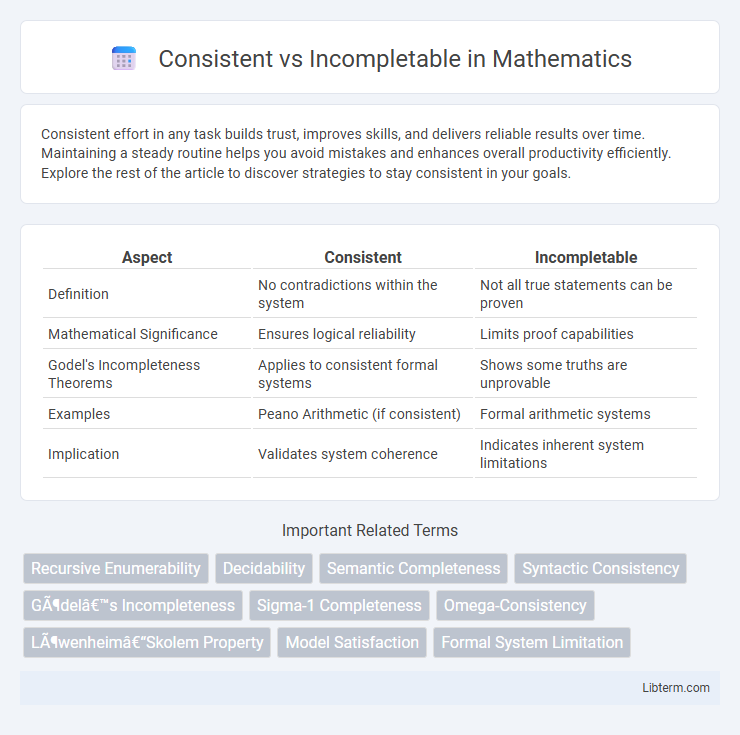Consistent effort in any task builds trust, improves skills, and delivers reliable results over time. Maintaining a steady routine helps you avoid mistakes and enhances overall productivity efficiently. Explore the rest of the article to discover strategies to stay consistent in your goals.
Table of Comparison
| Aspect | Consistent | Incompletable |
|---|---|---|
| Definition | No contradictions within the system | Not all true statements can be proven |
| Mathematical Significance | Ensures logical reliability | Limits proof capabilities |
| Godel's Incompleteness Theorems | Applies to consistent formal systems | Shows some truths are unprovable |
| Examples | Peano Arithmetic (if consistent) | Formal arithmetic systems |
| Implication | Validates system coherence | Indicates inherent system limitations |
Defining Consistent and Incompletable
Consistent refers to a set of statements or conditions that can all be true simultaneously without contradiction, ensuring logical coherence in a system. Incompletable describes a task or problem that cannot be finished or solved within the given parameters, often due to missing information or inherent complexity. Understanding the distinction between consistent and incompletable is crucial for problem-solving in logic, computer science, and mathematical reasoning.
Semantic Foundations of Consistency
The semantic foundations of consistency in logical systems ensure that a set of statements does not lead to contradictions, maintaining truth preservation across all models. Consistent theories have at least one model that satisfies every formula, whereas incompletable systems lack sufficient axioms or rules to derive all truths or maintain coherency. This distinction highlights the importance of semantic integrity in verifying the reliability and completeness of logical frameworks.
Understanding Incompletable Systems
Incompletable systems are characterized by inherent contradictions or constraints that prevent the completion of certain tasks or goals within their framework. Understanding these systems involves analyzing the underlying logical inconsistencies or limitations that disrupt the progress toward a solution. Identifying patterns of incompletable behavior aids in developing strategies to restructure or bypass such constraints in computational models or organizational processes.
Historical Context: Gödel and Incompleteness
Godel's incompleteness theorems, established in the early 20th century, revolutionized the understanding of formal mathematical systems by proving that any sufficiently powerful and consistent system cannot be complete. His first incompleteness theorem states that within such systems, there exist true statements that cannot be proven within the system itself, demonstrating inherent limitations to formal axiomatic frameworks. This historic insight emphasized the distinction between consistency, where no contradictions arise, and completeness, where all truths are provable, reshaping foundational studies in logic and mathematics.
Logic Systems: Balancing Consistency
In logic systems, consistent frameworks avoid contradictions, ensuring all statements coexist without conflict, which is crucial for reliable reasoning. Incompletable systems, often influenced by Godel's incompleteness theorems, lack the ability to prove every truth within the system, highlighting intrinsic limitations in formal logic. Balancing consistency requires designing logical systems capable of maintaining coherence while acknowledging the inherent incompleteness that restricts absolute certainty in mathematical proofs and formal theories.
Real-world Examples of Incompletability
Incompletability occurs in real-world scenarios such as scheduling problems where conflicting constraints prevent a complete solution, exemplified by the classic university timetabling challenge with overlapping class and room availabilities. Distributed database deadlocks illustrate incompletability when transactions wait indefinitely for resources held by each other, causing unresolved states. These examples highlight how complex constraint interactions lead to systems that cannot reach a complete, consistent outcome despite attempts to resolve conflicts.
Implications for Mathematics and Philosophy
Consistent systems in mathematics ensure that no contradictions arise, allowing the derivation of valid theorems and fostering logical coherence essential for proofs and formal reasoning. In contrast, incompletable systems, as highlighted by Godel's incompleteness theorems, reveal inherent limitations where certain truths remain unprovable within the system, challenging the notion of absolute mathematical completeness. Philosophically, this distinction impacts epistemology and the philosophy of logic by questioning the extent of human knowledge and the possibility of fully capturing mathematical truths through formal axioms.
The Role of Consistency in Formal Proofs
Consistency ensures that a formal system does not derive contradictions, preserving the reliability of proofs and preventing logical collapse. The role of consistency in formal proofs is critical as it guarantees that any theorem proven within the system is trustworthy and meaningful. In contrast, incompletable systems highlight limitations where not all truths can be formally proven, but maintaining consistency remains paramount for sound mathematical reasoning.
Challenges in Achieving Completeness
Achieving completeness faces challenges due to the presence of consistent yet incompletable data sets, where all constraints are simultaneously satisfiable but some values remain undefined or inaccessible. Incompletable instances arise from inherent limitations in data acquisition, processing constraints, or incomplete domain knowledge, leading to gaps in information despite overall consistency. Overcoming these challenges requires advanced data modeling techniques, robust validation mechanisms, and iterative refinement to approximate completeness without sacrificing consistency.
Future Directions in Logic and Semantics
Future directions in logic and semantics explore the interplay between consistent and incompletable theories, aiming to refine frameworks that handle partial or evolving information effectively. Research emphasizes developing advanced semantic models and proof systems to address incompletable structures while maintaining logical consistency. Innovative approaches in type theory, fixed-point semantics, and category theory contribute to robust foundations for reasoning under uncertainty and incomplete data.
Consistent Infographic

 libterm.com
libterm.com